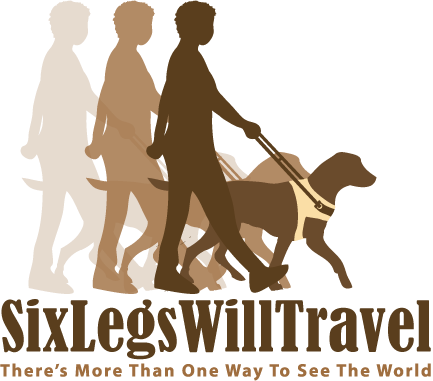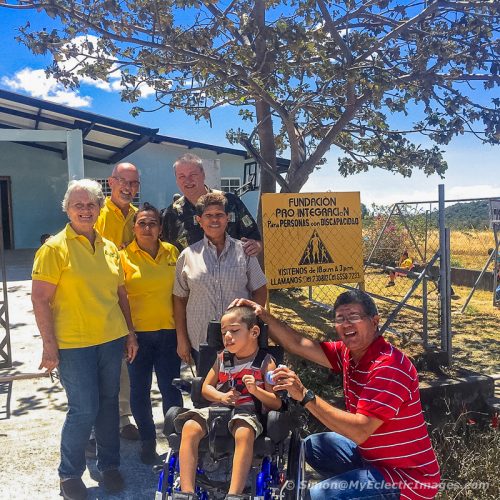The People the Travel Brochures Forgot:
Over the last three years, I’ve written at length about Panama, and what a happy and friendly country it is, and I stand by it. But, as with everywhere else, there are some less sparkling facets to this Central American jewel.
In 2014, Simon and I were in Boquete for a month. One of the first things Simon did was to seek out the local Rotary Club, so he could learn more about the group’s projects. His goal was to bring this information, as well as his insights, back to his New Bern Breakfast Rotary Club.
My curiosity and desire to learn more about Panama from people who lived there got the better of me, so I tagged along. As often happens, this simple act led to some of our most disturbing, yet rewarding experiences in this multi-faceted country.
During our first year, two underfunded and overextended organizations, inspired us to find ways to volunteer our time in support of the Boquete community on future visits.
Now in our fourth year in Boquete, we are picking up where we left off with ongoing projects, and beginning on our first full day, have found new ways to help.
Casa Hogar Trisker
The children were fascinated with Otto. I had taken off his harness so they could pet him, and they didn’t need much encouragement. The youngsters were clean, friendly and laughed a lot. This could have been a typical after-school visit, except for the fact that were in a protective facility for abused and abandoned children.
As we toured the property, the shocking and heartbreaking story of these children was revealed: malnutrition, physical abuse, abandonment, rape, incest, and other unspeakable conditions no child should ever have to endure.
One of the most heart wrenching scenes we witnessed was a 14-year-old girl holding her two-day old infant.
Children having children, many of whom were impregnated by a family member, is a tragedy all too often played out among Panama’s indigenous families. But at Casa Hogar Trisker, these at-risk mothers, as well as all the other children, receive medical care, education and a safe environment in which to heal.
The younger children are remarkably resilient, but the mothers face an uncertain future. Sadly, many return to the very environments from which their tragic circumstances stemmed. Others abandon their babies shortly after they’re born. But some take advantage of the education and skill training offered at Casa Hogar Trisker to give themselves and their babies a chance to survive and grow.
The organization is under-staffed, and funding is a constant struggle. When the monthly government allotment of dried beans and rice is gone, it’s gone. And that allotment is the same whether there are 30 children to feed or 60. Shortfalls of food are most often met by private donations from the community.
We were stunned by the plight of these children, and knew we had to help. From a historical perspective, a joint project involving the Boquete Rotary Club and the New Bern Breakfast Rotary Club was the most logical avenue to pursue. In fact, the Boquete club had recently spent $4,000 for a new water system after the complete failure of the previous system just before Christmas, 2013.

The Water System Provided by the Boquete Rotary Club at Casa Hogar Trisker (©simon@myeclecticimages.com)
Casa Hogar Trisker is a deliberately uninteresting facility, hardly worth a second glance on the road between Boquete and David, the capital of Chiriqui Province. It was in the early 1990s, an exceptional man left San Francisco for Panama and a new position as an English professor. His name was Denis Trisker, and for nearly 15 years, Boquete residents benefited from his teaching. When he left Panama, Denis Trisker donated the property that now bears his name to the David Rotary Club. The only condition accompanying this generous gift was that it would be designated as an orphanage. Responsibility for Casa Hogar Trisker is now shared between the David Club, the Boquete club and the Panamanian government.
Denis Trisker moved on, and became a Buddhist monk in a Tibetan Monastery. He eventually decided to make his home in Bolivia., But the combination of an idea originated by the David Rotary Club as part of Rotary International, and Denis Trisker’s generosity, resulted in a project that has rescued some of the most imperiled children in Chiriqui Province.
On behalf of the children, Simon persuaded the New Bern Club to partner with the Boquete club. It had been determined that the young mothers-to-be would benefit greatly from a separate area where they could bring their babies to term and care for their newborns. New Bern raised the funds, and Boquete made it happen.

The Dormitory for Expectant Mothers Built with Partial Funding from Rotary (©simon@myeclecticimages.com)
Although there is so much more that needs to be done, it was gratifying to know that we had set something positive in motion at Casa Hogar Trisker
Fundación Pro Integración – Capitulo de Boquete (FPI)
Mariano was 12 years old, profoundly deaf and nothing but trouble. At least that was his reputation at FPI, until he crossed paths with Simon.
We first learned of FPI, a program for children and adults with a variety of physical and mental disabilities, at our first Boquete Rotary meeting. Susan Peterson, a long-time resident of Boquete, and one of the most altruistic and involved women in the area, told us about FPI, and encouraged us to visit the following Saturday. By the time we left Panama in 2014, we were hopelessly hooked on the clients, staff and our fellow volunteers. Since then, we’ve been able to volunteer for almost every Saturday program when we’re in Panama, and have also found other ways to help.
Each Saturday, clients are brought in by volunteers and by way of special transportation funding. The volunteers do everything from working on puzzles, supervising children on the playground, teaching English, sign language and crafts, as well as making improvements and repairs to the facility. And that’s how Simon and Mariano came together.
On the first Saturday of our 2015 visit, Simon was putting a new desk together for the tiny administrative office. When he noticed Mariano watching him with rapped attention. Simon used the instructional drawings and some crude signing to engage the boy in the project.
By the time the desk was assembled, a bond had been formed, and Simon worked with Mariano every Saturday the boy was present. In fact, working with Simon became Mariano’s reward if he first attended sign language class, and behaved. Simon worked with Mariano and Christian, another deaf boy, on simple projects, and showed the boys how to make a wooden paper holder that they donated to the FPI office.

Mariano and Christian Proudly Display a Cabinet They Built with Minimal Adult Supervision (©simon@myeclecticimages.com)
Mariano is bright, affectionate and agile. His disruptive behavior was due in part to his being so smart, he bores quickly. When Simon showed him how to do new things, he was fully attentive.
One Saturday, Simon found a pair of hair clippers at FPI, and “talked” Mariano through shaving off most of his hair. This took place outside, and Mariano was so focused, I had time to call some of the other volunteers out to see this beautiful sight.
Sadly, Mariano’s prospects, and those of many of FPI’s clients, are limited. Most of the clients are indigenous, and live in extreme poverty. Mariano’s mother and siblings live in a a one-room shack with dirt floors and no furniture. Like many other clients, there’s no electricity or running water. Add to this the appalling shortage of trained professionals such as special education teachers, physical and occupational therapists and social workers, and the lost potential through lack of opportunity is beyond tragic.
Unlike North American and European countries, Central America is decades behinds in services for promoting productivity and integration for its disabled populations. The fortunate ones, like Joanna, who will soon be starting college, and Rodny, a young man with multiple disabilities who was educated in the U.S. and now runs his own business, are the exception. Several of the deaf women have found sources of income through cleaning houses and jewelry making, but for the vast majority of FPI clients, Saturday is the only day they leave the house or interact with anyone outside their families.
Through a generous private donation, the FPI clients and volunteers are treated to an annual outing to Borinquito in Concepcion, about an hour from Boquete. Busses take everyone to a large park, where clients enjoy a day of swimming, delicious traditional Panamanian food and games.

One of the More Severely Disabled Clients at FPI Enjoying a Day at the Swimming Pools in Borinquito (©simon@myeclecticimages.com)
Simon, Otto and I participated in two of these outings, and it was a delight to see the clients enjoying the pool and all the activities. To hear them laugh and chat, you’d never know this was the only such treat of the year for far too many. There was no complaining, just joy.
FPI receives funding from the government, grants, service organizations such as the Boquete Rotary Club, fundraising events and private donations. The money enables FPI to provide educational, therapeutic and medical support for it’s clients. Advocacy, and appropriate transportation are also made available. These are services these children and adults can get nowhere else.
Michael is 13 years old and blind. FPI was able to get him a white cane, but there is no orientation and mobility specialist to teach him how to use it. Damia is in her early 20s, profoundly deaf and is learning how to communicate, read and write so she can provide a better life for her two young children. Alberto became a paraplegic following an accident. With the help of physical therapy and other services provided by FPI, He’s now beginning to find his feet with a walker. These are just some of the clients we have come to know, and they are as much a part of our lives as the people with whom we come into contact at home.
Blanche is a retired teacher of the deaf, lives in Toronto and is in her late 70s. Through a Rotary grant, she travels to Boquete for three months every year to bring the gift of communication to adults and children who are deaf.
Chuck lives in Boquete, and uses his experience as a retired occupational therapist to help clients manage daily living tasks. Mike and Judy are expats from Kentucky. Judy patiently works on puzzles and other recreational activities with some of FPI’s most needy clients, while Mike uses his talents to help maintain the facility. These are our fellow volunteers, and some of the most loving and giving individuals on the planet.

The Late Jacqui, a Locally Trained Therapist, and Chuck, a Retired Occupational Therapist, with a Client in a Brand New Specialized Wheelchair Donated by the Coronado, Panama, Rotary Club (©simon@myeclecticimages.com)
Holding the whole thing together is Loesje, originally from Holland, who along with her British-born husband, Ron, own a farm in the Boquete area. A volunteer herself, Loesje is FPI’s volunteer coordinator, She is always there to put out fires – not literally, of course – and help the volunteers make the most of their skills on behalf of the clients. Susan is at FPI most Saturdays, and wouldn’t miss an annual outing.
What do Simon and I do? We do what ever needs doing with and for the clients. Simon also helps with maintenance issues, and I am working on editing a volunteer handbook for FPI. We work hard, and sometimes, as in the case of Mariano, we see that we are making a difference.
But Wait. There’s More
Every February, Boquete host a jazz and blues festival. Proceeds go to providing musical instruments and lessons for area school children, and is primarily volunteer driven. Simon takes photographs of the different events and helps out in the green room. I wash dishes for the duration of the festival to insure the artists eat off clean plates, with clean utensils when they’re there. This will be our third year working the festival, and are looking forward to four totally exhausting, and equally gratifying days next month.

Lee Oscar Accompanying a Group of Children Playing in Public for the First Time After Spending the Morning Learning Basic Musical Skills from some of the Boquete Jazz and Blues Musicians Who Volunteered Their time to Work with the Children (©simon@myeclecticimages.com)
There is always something to do. The day after we arrived Simon helped fill bags with candy for an annual party in the square for indigenous children. I joined him and six fellow volunteers the next day in making over 400 sandwiches for the festivities.

Volunteers Making Sandwiches to Give to the Local Indigenous Children on New Years Eve (©simon@myeclecticimages.com)
Why do we work so hard for people we don’t even know, when we could be relaxing and soaking up the warm Boquete sunshine? Because we can. Because we want to. And because we have come into contact with the finest of the fine: international expats and visitors to Boquete, who cast a ray of light into some of Panama’s darkest corners.
Are you passionate about volunteering? Is there a specific volunteer project that makes your heart sing? Tell us about it in the comments.












Hello!
I plan on retiring to Panama as soon as the Covid is over and we can travel. one of the main draws for me is the orphange- I want to volunteer there. i will be a retired secretary and am so looking forward moving there!
I wish you all the best for your retirement to Panama. Your help as a volunteer is much needed, and will be much appreciated.
Jerry and I are very excited about sharing the volunteer experience here! See you in a few weeks.
Looking forward to having you join us. I’ll be surprised fi you don’t get hooked like we did.
Thanks for sharing the stories of the children and the volunteers. You are truly inspiring! Wishing you and Simon the best of health in the coming year~
Thank you, Irene. We have grown to love Panama and its people. Being able to help in some way has been gratifying on many levels. If you really want to be inspired, visit La Fundacion if you’re ever in Boquete. And a happy and healthy 2017 to you and Jerry. Looking forward to reading about more of your adventures.
Thank you, to both you and Simon, for sharing this inspirational and ongoing story. I’m so proud to know you both and to share your passion for helping others, not just as a member of the New Bern Breakfast Rotary, but also as another individual who wants to make a difference in the world.
Thank you, Deedra. And the feeling is mutual. You are truly a joy to know, and an inspiration for us to continue on the path we have chosen here in Panama and at home.
Interesting story Penny and Simon! We were not aware of the orphanage, but it is because of generous and loving people like yourselves that help and assistance is given to where it is needed most. Boquete is lucky to have you visit!
One of the reasons Casa Hogar Trisker tends to fly below the radar is to protect the children. Many have been taken from violent environments, and their safety trumps any need for publicity. Had it not been for our Rotary connection, we never would have known about the facility either.